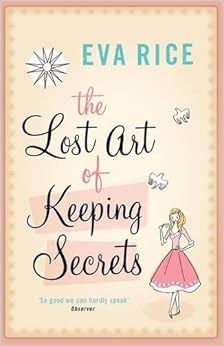There is nothing quite as cleansing as finally reading a book that’s been on your TBR list for untold ages. Ana of Things Mean a Lot reviewed it in 2012, which is on the outer edge of how long I’ll let a book linger on my TBR spreadsheet. If I’ve let it go for five years without reading it, I have to accept that I didn’t truly want to read it in the first place.1 Alice from Of Books reminded me more recently why I wanted to read it, so thanks to both of you, lovely blogging friends!

As Ana and Alice both mention in their posts, The Lost Art of Keeping Secrets recalls almost irresistibly I Capture the Castle, a comparison of which I had absolutely no recollection when I started reading. And perhaps it’s best that I didn’t; comparing a new book to one of the twentieth century’s great works of fiction is hardly a recipe for success. Please forget I said that. Except don’t, because I want you to read this book. Except do, because I don’t want to get your expectations too high.
 The Lost Art of Keeping Secrets is about a girl called Penelope who lives in a ramshackle old manor house called Milton Magna in postwar England. She rattles around her old manor house with her younger brother Inigo, who dreams of being a pop star, and her beautiful, widowed mother, married at seventeen and widowed in the Second World War. As Penelope is waiting tidily at the train station, a total stranger swoops in and carries her off to have tea with her family, and Penelope’s life changes entirely. In a manner that is not entirely unlike, yet not so much like that it should raise your expectations in a significant way, the events of I Capture the Castle.
The Lost Art of Keeping Secrets is about a girl called Penelope who lives in a ramshackle old manor house called Milton Magna in postwar England. She rattles around her old manor house with her younger brother Inigo, who dreams of being a pop star, and her beautiful, widowed mother, married at seventeen and widowed in the Second World War. As Penelope is waiting tidily at the train station, a total stranger swoops in and carries her off to have tea with her family, and Penelope’s life changes entirely. In a manner that is not entirely unlike, yet not so much like that it should raise your expectations in a significant way, the events of I Capture the Castle.
I can at least say that without specifically remembering the I Capture the Castle comparison,2 I was immediately charmed by The Lost Art of Keeping Secrets. Penelope spends a great deal of time thinking about romantic love; but the fundamental relationships in the book are between Penelope and Charlotte and, to a lesser extent, Penelope and her maddening, dramatic, married-too-young mother. The book was a frothy delight from the first page, and if it’s not exactly up to the standard set by I Capture the Castle, it’s at least along the lines of a lesser Dodie Smith book or an ungrim Maggie O’Farrell novel. If that’s something you need (in this grim dystopian hellscape), go forth and read it with my blessing.
(Note that I had to bust out the old “Sparkly Snuggle Hearts” category for this book. That is an exact description of how I felt about it.)